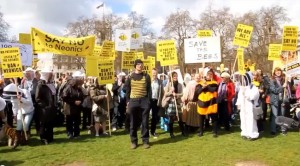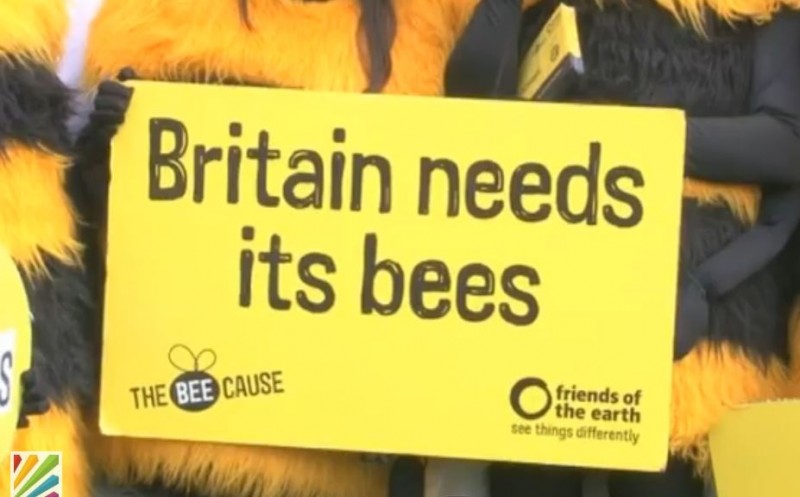■ £510 million of annual total crop sales in the UK are pollinated by bees and other insects.
■ Replacing bee pollination with hand pollination could cost farmers £1.8 billion a year in labour and pollen alone.
■ The price of many fruits and vegetables would go up without bees. The price of British apples could double.

Hundreds of British Beekeepers and others held a protest in London today to demand that Environmental Minister Owen Patterson backs moves to ban the worst bee-harming neonicotinoid pesticides. Beekeepers were joined by food producers, gardeners and other concerned individuals.
*EFSA scientists have identified a number of risks posed to bees by three neonicotinoid insecticides.
Members of the Environmental Audit Committee (EAC) have spent months hearing evidence on both sides of the argument and its report is unanimously in favour of the ban.
Even MPs from the Government’s own Conservative and Liberal Democrat parties agree Ministers should back a neonicotinoid ban – and dramatically improve the process for testing pesticide safety, but so far the Government has refused to follow the advice and implement this ban.
ADD YOUR VOICE
Sign the Bee Cause Petition organised by Friends of the Earth
Sign the Petition on 38 Degrees
Sign the Petition on Avaaz.org
USA:
Sign the Petition on Change.org
One beekeeper interviewed in this video says:
“I’ve lost three colonies of bees, my neighbouring beekeeper has lost four colonies of bees and we routinely had about 80 to 70 jars of honey a year and last year had 4.”
There is enough pressure on bees already to make their survival difficult, without the use of pesticides that are believed to be linked with the loss of millions of bees worldwide.
Some of the other damaging effects on bees are climate change, damage to their natural environments, other chemicals and toxins that humans have already unleashed on the planet.
“Ministers can’t ignore the growing scientific evidence linking neonicotinoid insecticides to bee decline. Their claims to be concerned about bee health will ring hollow if they fail to back European moves to restrict the use of these chemicals.
An ever-growing number of the UK’s leading retailers and manufacturers are recognising the threat these products pose by removing them from their shelves and supply chains – the Government must act now.
If we lose our bees and other vital pollinators it’ll have a devastating impact on our food, gardens and environment. We urgently need tougher pesticide restrictions and a British Bee Action Plan to tackle all the threats they face.”
— Andrew Pendleton — Friends of the Earth’s Head of Campaigns
Fashion designers Vivienne Westwood and Katharine Hamnett helped to deliver a petition to 10 Downing Street
The demonstration took place ahead of the vote in Brussels on Monday that will decide whether Europe will introduce a two-year moratorium on a variety of neonicotinoid pesticides.
“Britain abstained last time and has made no commitment this time, but we want them to support a ban across Europe. Some 73% of the British public support a ban on these insecticides, we want the Government to follow their lead.”
— Matt Shardlow, chief executive of nature conservation organisation Buglife, and one of the organisers of the protest
***
“They started using these pesticides in the 90s. Since then there has been a rapid decline in the abundance and diversity of bee species globally.
There is a mounting body of scientific evidence that these pesticides are having sub lethal effects and in effect making the bees sick. They can make them forget things, such as which flowers are rewarding to them, and impair their ability to reproduce, affecting their long-term survival.
Bees are responsible for a large proportion of the world’s pollination, they are very important economically as well as ecologically.
I would see a two-year moratorium as a start. If it came into effect, we would see bee species start to recover, and would then need to extend the ban further.“
— Robert Mitton, biological research graduate from London, and one of the protesters.
***
A Newcastle University Study found that one in five bees exposed to imidacloprid from the neonicotinoid family of pesticides, that is commonly used on UK crops including oilseed rape, were “unable to learn”.
This means the whole colony is affected because the bees rely on memory to find flowers and bring back nectar to the hive.
Other groups involved with organising the event included Friends of the Earth, Greenpeace, Pesticide Action Network UK, RSPB, and the Soil Association.
* The European Food Safety Authority (EFSA) is an agency of the European Union that provides independent scientific advice and communication on existing and emerging risks associated with the food chain



